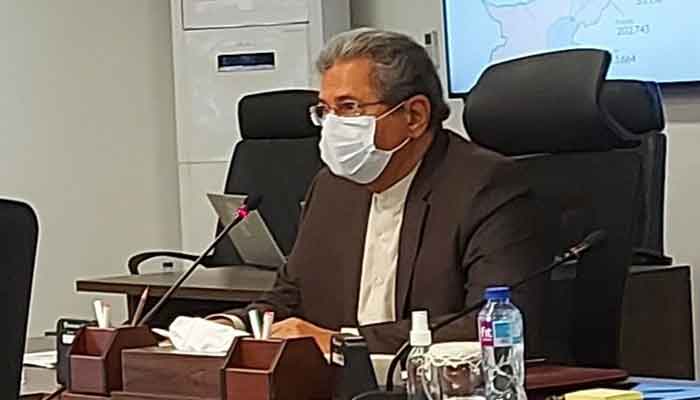Schools in coronavirus-hit cities to remain closed till April 11: Shafqat Mehmood
Ninth grade, Matric and Intermediate exams will be held as per schedule announced by the boards, says Shafqat Mehmood
ISLAMABAD: Federal Education Minister Shafqat Mehmood on Wednesday briefed the media regrading updates on the closure of schools after an important meeting of education and health ministers at the National Command and Operation Centre (NCOC).
He said the educational institutions which were closed earlier due to high positivity rates, will remain shut till April 11. Provincial governments and authorities in Azad Kashmir and Gilgit Baltistan are empowered to take the final decision in this regard, keeping the latest situation in mind, he added.
He clarified that school administrators can continue to call in teachers in affected districts if they want to.
Key decisions:
- Education institutes to remain closed in COVID-19 hotspots till April 11, which were earlier closed on March 15 for two weeks.
- Ninth, Matric and Intermediate exams will be held as per the schedule announced by the boards.
- Govt to hold a meeting with Cambridge International Examinations to check whether a change in exams schedule is possible or not.
- Provincial governments can decide about adding more cities/districts to list where all educational institutions will remain closed.
- Status quo will remain in Sindh, Balochistan and Gilgit Baltistan, where the situation is relatively better. However, authorities can act based on developments.
"The meeting noted with concern the worsening situation of the disease in Lahore and several cities of Punjab and also in some districts of Khyber Pakhtunkhwa," Mehmood said in his briefing.
Mehmood said the authorities are aware of the losses borne by students, but the health of children is the government's top priority and there would be no compromise on that.
Regarding Cambridge International Exams, the minister said that the government would hold a meeting with the CAIE officials to see whether examinations can be postponed or not.
Meanwhile, "ninth, Matric and Intermediate exams will be held as per schedule announced by the respective education boards," he said.
The federal minister emphasized that when he says educational institutes, he means all educational institutions, including schools, colleges, universities and religious seminaries.
"The next meeting of the education and health ministers will be held on the April 7 to review the whole situation and then take the decision accordingly," he added.
Sindh Education Minister Saeed Ghani, however, said shortly after the meeting that schools should remain open in cities where the pandemic is under control.
While talking to Geo Pakistan, he said that the positivity ratio in Sindh educational institutes is 2.8%, but Sindh's final decision on schools will depend on data shared by the NCOC.
According to NCOC data, the number of COVID-19 active cases has more than doubled in Pakistan in the last three weeks, while the national positivity ratio has remained above 8% during the last few days.
NCOC wary of COVID-19 spread in schools
In a separate statement on Monday, Mehmood said that he was not in favour of shutting down educational institutes but the NCOC believed that there’s a high risk of coronavirus spread through schools.
“50 million children are linked with education and if someone gets infected, the disease would spread [rapidly]," he said.
It is pertinent to note that schools, colleges and universities were allowed to resume regular classes from March 1.
On March 10, however, the federal government was forced to announce a two-week Spring Break in Islamabad, Peshawar and seven Punjab cities and impose restrictions to control the spread where positivity rate was high.
More restrictions imposed
On Monday, the NCOC had decided to implement high impact interventions in cities with over 8% positivity ratio during the rising third wave of the pandemic till April 11.
The forum expressed grave concern over the current COVID-19 situation in the country and unanimously agreed on the implementation of the following high impact interventions in cities and districts with a positivity ratio greater than 8% (based on a three-day rolling average) to contain the disease spread.
The NCOC agreed to implement broader lockdowns with stringent enforcement protocols based on risk assessment.
Further, no mobility would be allowed in locked down areas except emergencies, it added.
The forum also agreed on the closure of all types of indoor dining. However, outdoor dining was permitted till 10pm along with takeaways.
It also decided to implement the closure of all commercial activities (less essential services) by 8pm whereas two safe days per week would be observed (no commercial or business centre to operate on these days).
The forum had also banned all sorts of indoor gatherings due to their potential to become super spreader events.
However, gatherings with an upper limit of 300 persons have been allowed with strict adherence of COVID-19 standard operating procedures (SOPs).
"However, all types of indoor gatherings involving cultural, musical and religious or miscellaneous event will be banned," it said.
It underscored that no indoor functions would be allowed.
The forum also put complete closure of amusement parks, however, walking and jogging tracks would remain open with strict adherence of SOPs.
In order to contain disease spread, the officials also decided to limit intercity public transport and allowed it to operate at 50% of its available capacity.
However, rail service was allowed to operate at 70% of its capacity to contain disease transmission within the districts amid the third wave of the contagion.
-
Security forces gun down 30 terrorists in multiple IBOs in KP: ISPR
-
MQM-P calls for new province in Sindh
-
US report validates Pakistan military edge over India: PM
-
Banned TTP poses serious threat to Pakistan security: UNSC panel
-
CM Afridi clarifies remarks on by-poll after ECP requests army deployment
-
Dubai sees 3.2m Pakistani passengers in 2025 as airport sets new milestone
-
Security forces kill 23 Indian proxy terrorists in KP's Kurram
-
Pakistan to construct island to boost oil exploration: report












